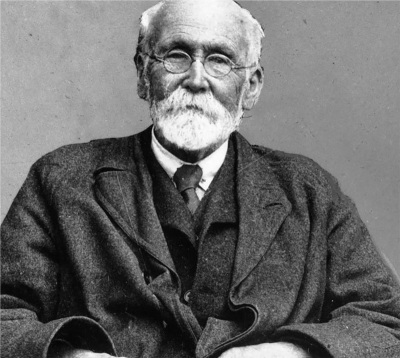
For 14-year-old Joseph travelling with his father to Ireland and seeing the appalling effects of the Great Famine, where at least one million poor people starved to death, was to have a real impact on his life. From 1836 to 1850 the potato crop which would normally feed about 60% of the population failed. Lack of any real government intervention or constructive action caused widespread death and it was estimated that some 500,000 left the country during this time and over a million died.
This experience in Ireland would shape Rowntree’s political and business ideas later in life. Joseph’s family owned a grocery shop in York, England. Joseph was the second son and worked alongside his father.
Rowntree took over his family’s business after his father died 1859. In 1869, he left the family owned grocery store and joined his younger brother Henry to run a cocoa, chocolate and chicory factory. However, their growth as a company competing in the cocoa and chocolate market was heavily restricted by the successful marketing of the Cadbury organisation.
In 1879 Claude Gaget, a French confectioner, was employed to develop a new line of product which at this stage was mainly produced in France. This included fruit pastilles and gums which were an instant success and caused the business to flourish.
In 1883 there were signs of a trade recession and in the same year Henry Rowntree only 45 years of age, died leaving a wife and three children. This left Joseph solely in charge of the business. It was very important to Joseph Rowntree that his factory produced top quality products, but that his employees also had improved quality of life. Some of the original products which have since been taken over by other companies, include Smarties, Kit Kat and Dairy Box, now Dairy Milk Chocolate.

“A lifelong Quaker, Joseph seldom spoke about his religious beliefs, but they informed his home life, his commitment to social reform and his business practice”.
Rowntree belonged to the Quaker faith. This is a religion that believes all people are equal and mostly good. They are a very peaceful and anti-violence group. They believe that “God is love, the light of God is in every single person, a person who lets their life be guided by that light will achieve a full relationship with God. Everyone can have a direct, personal relationship with God without involving a priest or minister. Redemption and the Kingdom of Heaven are to be experienced now, in this world.”
Joseph Rowntree’s Christian teachings embraced the idea to improve the world and make it a better place. They are very concerned with human rights, environmental issues, social justice, living as a community and peace. Knowing this, it is easy to see how his faith influenced his life. He left a positive mark on the work and his legacy continues today.
During his life, Rowntree pushed for social reform, and provided adult literacy programs and medical services for his employees. In 1904 he founded trusts that still operate today including: Joseph Rowntree Village Trust (JRVT) , Joseph Rowntree Charitable Trust (JRCT) and the Joseph Rowntree Social Services Trust (JRSST).
“Philosophical and political views: Joseph Rowntree was a supporter of liberal values and was anxious to improve the quality of life of his employees. He provided them with a library, free education, a works magazine, a social welfare officer, a doctor, a dentist and a pension fund”.

But his life was not spared from tragedy. Joseph’s first wife Julie Eliza Seebohm who he married in 1862 died a year later. His second marriage to Emma Antoinette Seebohm, a cousin of his first wife, took place in 1867 and they had six children.
Rowntree died on 24 February 1925 aged 89. He is buried with a simple headstone in the Quaker cemetery in York, England. The city of York mourned his passing.
What are the lessons we can take away from Joseph Rowntree’s life? How often does our faith affect how we treat people? Or our environment? Do we seek justice for all? Or abandon people who are in the “too hard” basket? Joseph Rowntree’s life is faith in action. He did not need to advertise what he believed because he lived it every day, at work and at home.
Written by Chanell Diaz for Did You Know Education

Graham McDonald is the President of Diduno